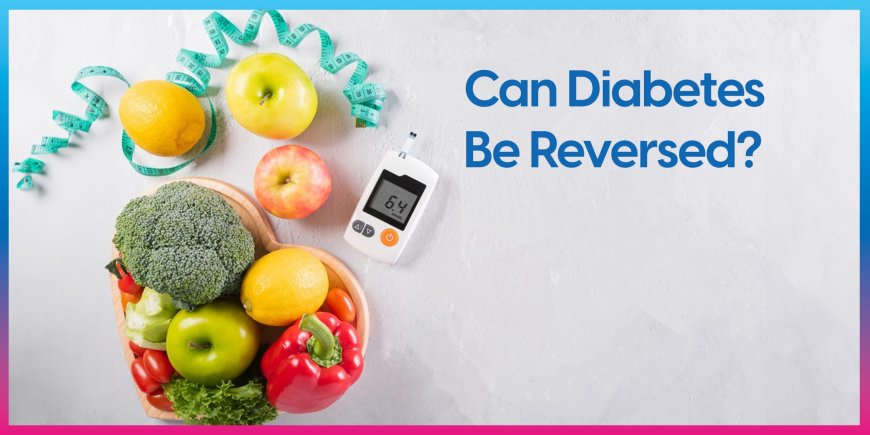Can You Reverse Type 2 Diabetes with Lifestyle Changes? Here’s What Science Says
Can Type 2 diabetes be reversed? Discover how diet, exercise, and lifestyle changes can help achieve diabetes remission naturally.

Introduction: Is Type 2 Diabetes Really Reversible?
Type 2 diabetes has long been considered a chronic and progressive condition. However, growing research suggests that with the right lifestyle changes, many people can put the disease into remission—meaning normal blood sugar levels without medication.
But how realistic is it to reverse Type 2 diabetes, and what does it take? In this article, we’ll break down the science of diabetes remission, the role of diet, exercise, and weight loss, and the lifestyle habits that can make a real difference.
Understanding Type 2 Diabetes: What Causes It?
Type 2 diabetes occurs when the body becomes resistant to insulin, a hormone that regulates blood sugar. Over time, the pancreas struggles to keep up with insulin production, leading to chronically high blood sugar levels.
Key Risk Factors for Type 2 Diabetes
- Excess body weight (especially around the abdomen)
- Poor diet high in refined carbs and sugar
- Sedentary lifestyle
- Genetic predisposition
- Chronic stress and poor sleep
While genetics can play a role, research shows that lifestyle factors are the biggest contributors—and that means they can also be the solution.
Can Type 2 Diabetes Be Reversed?
The short answer is yes—but it depends on several factors.
According to a study published in The Lancet, significant weight loss (through diet and exercise) can lead to long-term remission in nearly half of people with Type 2 diabetes. (Read the study).
However, reversal is not the same as a permanent cure. If a person returns to unhealthy habits, blood sugar levels may rise again. This is why long-term commitment to lifestyle changes is essential.
Key Lifestyle Changes That Help Reverse Type 2 Diabetes
1. Lose Excess Weight (Especially Belly Fat)
Why it works: Excess fat, especially visceral fat around the organs, impairs insulin function. Losing 5-10% of body weight can significantly improve blood sugar levels.
✔ Best weight-loss strategies:
- Caloric deficit: Consuming fewer calories than you burn
- Low-carb or Mediterranean diets (more on this below)
- Intermittent fasting (Research shows it improves insulin sensitivity)
2. Adopt a Low-Carb or Whole-Food Diet
✔ Best diets for diabetes reversal:
- Low-carb diet: Reduces insulin demand by lowering blood sugar spikes
- Mediterranean diet: Rich in healthy fats, fiber, and lean protein
- Plant-based diet: Linked to improved blood sugar control and weight loss
A study published in Diabetes Therapy found that low-carb diets significantly lower blood sugar and may lead to remission. (Read more).
3. Engage in Regular Physical Activity
✔ Why exercise helps:
- Improves insulin sensitivity (cells absorb glucose more efficiently)
- Reduces body fat and increases lean muscle mass
- Lowers stress levels and inflammation
✔ Best exercises for diabetes reversal:
- Strength training (2-3 times per week)
- Walking (30-60 minutes per day)
- High-intensity interval training (HIIT)
- Yoga and stretching for stress reduction
A 2020 study found that walking for just 30 minutes daily reduces diabetes risk by 30%. (Source).
4. Prioritize Sleep and Stress Management
✔ How sleep affects blood sugar:
- Poor sleep increases cortisol, a hormone that raises blood sugar
- Lack of sleep reduces insulin sensitivity
✔ Ways to improve sleep:
- Stick to a consistent bedtime
- Reduce screen time before bed
- Avoid caffeine in the evening
✔ Stress reduction techniques:
- Meditation and deep breathing
- Time in nature
- Journaling and mindfulness
5. Monitor Blood Sugar and Adjust Accordingly
✔ Why tracking matters:
- Helps identify food triggers that spike blood sugar
- Allows for better meal planning and portion control
- Keeps you accountable and motivated
✔ Best ways to monitor blood sugar:
- Use a continuous glucose monitor (CGM)
- Keep a food and blood sugar diary
- Work with a healthcare provider for guidance
Real-Life Success Stories: Can It Actually Work?
Many people have successfully reversed Type 2 diabetes through lifestyle changes.
Example: The Diabetes Remission Clinical Trial (DiRECT Study)
- Participants followed a low-calorie diet (800-1200 kcal/day) for 12-20 weeks
- 46% achieved diabetes remission within a year
- Those who lost 10-15% of body weight had the highest success rate
Key Takeaways: Can You Reverse Type 2 Diabetes?
✔ Yes, it’s possible, but it requires long-term commitment.
✔ Weight loss and diet play the biggest roles.
✔ Exercise improves insulin sensitivity and overall health.
✔ Managing stress and sleep is crucial for blood sugar control.
✔ Regular blood sugar monitoring helps track progress and make adjustments.
Final Thoughts: Take Control of Your Health Today
Type 2 diabetes doesn’t have to be a lifelong condition. While genetics play a role, lifestyle changes have the power to restore blood sugar balance and improve overall well-being.
If you or a loved one is managing diabetes, start small—make gradual, sustainable changes. Whether it’s cutting out processed foods, walking daily, or improving sleep, every step counts.
What's Your Reaction?
 Like
0
Like
0
 Dislike
0
Dislike
0
 Love
0
Love
0
 Funny
0
Funny
0
 Angry
0
Angry
0
 Sad
0
Sad
0
 Wow
0
Wow
0



















































